

Phrasal Verb Dictionary. To look up a phrasal verb, click a letter in the menu.
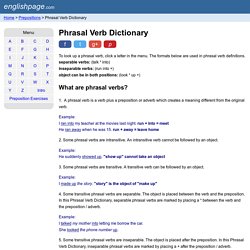
The formats below are used in phrasal verb definitions.separable verbs: (talk * into)inseparable verbs: (run into +)object can be in both positions: (look * up +) 1. A phrasal verb is a verb plus a preposition or adverb which creates a meaning different from the original verb. Example: I ran into my teacher at the movies last night. run + into = meet He ran away when he was 15. run + away = leave home 2.
Example: He suddenly showed up. 3. Example: I made up the story. 4. Example: I talked my mother into letting me borrow the car. 5. English Grammar rules and teaching ideas. Idioms and phrases. Make or Do Quiz. The choice between 'make' or 'do' is difficult in English.
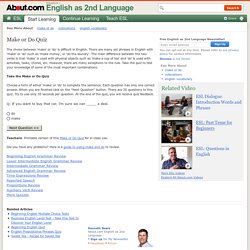
There are many set phrases in English with 'make' or 'do' such as 'make money', or 'do the laundry'. The main difference between the two verbs is that 'make' is used with physical objects such as 'make a cup of tea' and 'do' is used with activities, tasks, chores, etc. However, there are many exceptions to the rule. Take the quiz to test your knowledge of some of the most important combinations. Make or Do - Printable Teacher Handout. You said what? An Unplugged Grammar Review of Question Formation, “memory and mingle”. A designer lessons ESL lesson plan developed by George Chilton No-one expects the Spanish inquisition.
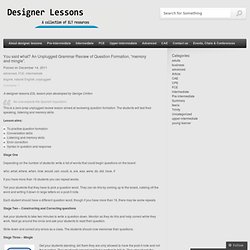
This is a zero-prep unplugged review lesson aimed at reviewing question formation. The students will test their speaking, listening and memory skills. Lesson aims: To practise question formationConversation skillsListening and memory skillsError correctionSyntax in question and response Stage One Depending on the number of students; write a list of words that could begin questions on the board: who, what, where, when, how, would, can, could, is, are, was, were, do, did, have, if. Vocabulary: teaching make and do. By Jonathan Marks Advice and teaching suggestions of how to overcome the confusion between 'make' and 'do.' I live and work in the Dominican Republic, where Spanish is the native language.
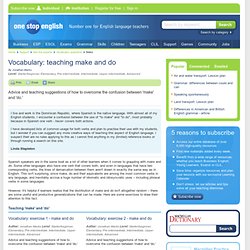
With almost all of my English students, I encounter a confusion between the use of "to make" and "to do", most probably because in Spanish one verb - hacer- covers both actions. I have developed lists of common usage for both verbs and plan to practise their use with my students, but I wonder if you can suggest any more creative ways of teaching this aspect of English language. I suspect their are no rules applying to this as I cannot find anything in my (limited) reference books or through running a search on this site. Linda Stapleton Spanish speakers are in the same boat as a lot of other learners when it comes to grappling with make and do. Free Printable English Worksheets For Teachers. English Grammar Pill: How to use the future tenses correctly. Many of you will know that I am a huge fan of mind maps and infographics.
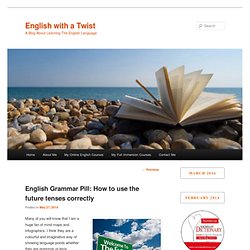
I think they are a colourful and imaginative way of showing language points whether they are grammar or lexis. I haven’t had the time to create my own mind maps, however I have made good use of the excellent resources available from my creative fellow teachers to help me with my posts. And today is no exception. During my research for this post, I came across this wonderful mind map created by Blog Educativo.
I think it shows very clearly the different uses of the future tenses in English. I will give an example sentence for each use as illustrated in the mind map. Photo: Structure. ENGAMES. Past Simple or Present Perfect 1. Choose the past simple or the present perfect.
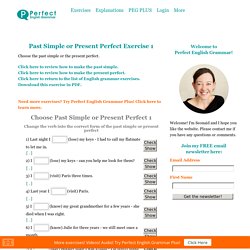
Click here to review how to make the past simple.Click here to review how to make the present perfect.Click here to return to the list of English grammar exercises.Download this exercise in PDF.Need more exercises? Try Perfect English Grammar Plus! Click here to learn more. Change the verb into the correct form of the past simple or present perfect Go to the main grammar exercises page. About. Phrasal-verbs-with-off-and-up.doc. Phrasal-verbs-with-out.doc. Relatively Speaking: 5 Strategies for Teaching Relative Clauses. Not All Clauses Are Created Equal: A Review of English Clauses. That, Which, and the Other: 3 Constructive Ways to Reinforce Relative Clauses. CAG_OnlineTR_web. Intermediate Grammar Games. Idioms and phrases. Making Simple Present Tense Questions. Pronunciation- Past Tense Regulars and Adjectives. Speaking lesson plans. Learn English - Grammar, Vocabulary, Speaking, Exercises, Lessons.
Comparatives and Superlatives (Young Adults/Adults- Beginning/Elementary) Grammar: differences between could and can. By Jonathan Marks An article discussing the differences between 'could' and 'can' when expressing possibility.
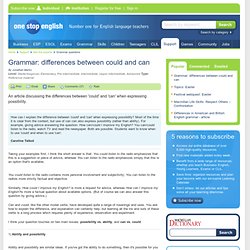
How can I explain the difference between 'could' and 'can' when expressing possibility? Most of the time it is clear from the context, but use of can can also express possibility (rather than ability). For example, giving advice answering the question: How can/could I improve my English? You can/could listen to the radio, watch TV and read the newspaper. Caroline Talbot Taking your examples first, I think the short answer is that: You could listen to the radio emphasizes that this is a suggestion or piece of advice, whereas You can listen to the radio emphasizes simply that this is an option that's available.
You could listen to the radio contains more personal involvement and subjectivity; You can listen to the radiois more strictly factual and objective. Will and Going to (Beginner/Elementary)